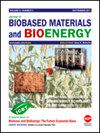The Impact of Chemical Fertilizer Application on Ascorbic Acid-Glutathione Cycle, Methyl Jasmonate and Nitrosoglutathione Related Substances of Antioxidant Systems in Tobacco
IF 0.5
4区 医学
引用次数: 0
Abstract
The unreasonable application of chemical fertilizer as abiotic stress can affect the production of reactive oxygen species (ROS) and the synthesis of related substances, thereby affecting the antioxidant systems mediated by Ascorbate-glutathione (AsA-GSH) cycle, Methyl jasmonate (MeJA), S-Nitrosothiols (SNOs) in tobacco plants. Up to now, further research is needed on the impact of chemical fertilizer application on the above antioxidant system in tobacco plants. In this study, the flue-cured tobacco cultivar ‘Yunyan 87’ (Nicotiana tabacum L.) was used as the material. The content of non-enzyme antioxidants and related enzyme activities of AsA-GSH cycle system, the content of MeJA and SNOs in tobacco leaves, as well as tobacco yield were detected, to study the effects of different amount of fertilizer application (T1 = 30 g/plant, T2 = 45 g/plant, T3 = 60 g/plant) on related indicators of antioxidant system. The results indicated that the content of non-enzymatic antioxidants (AsA and GSH) and the activities of related enzymes in the AsA-GSH cycle, including ascorbate peroxidase (APX), glutathione reductase (GR) and monodehydroascorbate reductase (MDHAR) exhibited first increased and then decreased with increasing amount of fertilizer application. Most of the treatments showed significant differences. T3 treatment markedly reduced MeJA content compared to T1 and T2 treatments. With the increase of fertilizer application, the content of SNOs and the activity of S-Nitrosoglutathione reductase (GSNOR) in tobacco leaves exhibited an initial increase, followed by a decrease, and finally increasing trend, with notable differences among most treatments. Tobacco yield markedly decreased in the T1 treatment compared to the T2 and T3 treatments; however, no obvious difference between T2 and T3 treatments. Altogether, the fertilizer application of T1 (30 g/plant) was too low, which was not conducive to the synthesis of antioxidant substances in tobacco leaves. However, the fertilizer application amount of T3 (60 g/plant) was attributed to excessive application, which caused high salt stress on the growth of tobacco plants. This study provides a basic reference for optimizing fertilizer application in tobacco production.化肥施用对烟草抗氧化系统抗坏血酸-谷胱甘肽循环、茉莉酸甲酯和亚硝基谷胱甘肽相关物质的影响
非生物胁迫下不合理施用化肥会影响活性氧(ROS)的产生和相关物质的合成,从而影响烟草植物中由抗坏血酸-谷胱甘肽(AsA-GSH)循环、茉莉酸甲酯(MeJA)、S-硝基硫醇(SNOs)介导的抗氧化系统。到目前为止,还需要进一步研究化肥施用对烟草植物上述抗氧化系统的影响。本研究以烤烟品种“云烟87”(Nicotiana tabacum L.)为材料。通过测定AsA-GSH循环系统的非酶抗氧化剂含量和相关酶活性、烟叶中MeJA和SNOs含量以及烟草产量,研究不同施肥量(T1=30g/株、T2=45g/株、T3=60g/株)对抗氧化系统相关指标的影响。结果表明,随着施肥量的增加,非酶抗氧化剂(AsA和GSH)的含量以及AsA-GSH循环中相关酶的活性,包括抗坏血酸过氧化物酶(APX)、谷胱甘肽还原酶(GR)和单脱氢抗坏血酸还原酶(MDHAR),呈现先增后减的趋势。大多数处理显示出显著差异。与T1和T2处理相比,T3处理显著降低了MeJA含量。随着施肥量的增加,烟叶中SNOs含量和S-亚硝基谷胱甘肽还原酶(GSNOR)活性呈现出先升高后降低,再升高的趋势,大多数处理之间差异显著。与T2和T3处理相比,T1处理的烟草产量显著降低;但T2和T3处理无明显差异。总的来说,T1(30g/株)的施肥量太低,不利于烟叶中抗氧化物质的合成。然而,T3(60g/株)的施肥量归因于过量施用,这对烟草植株的生长造成了高盐胁迫。本研究为烟草生产中优化施肥提供了基础参考。
本文章由计算机程序翻译,如有差异,请以英文原文为准。
求助全文
约1分钟内获得全文
求助全文

 求助内容:
求助内容: 应助结果提醒方式:
应助结果提醒方式:


